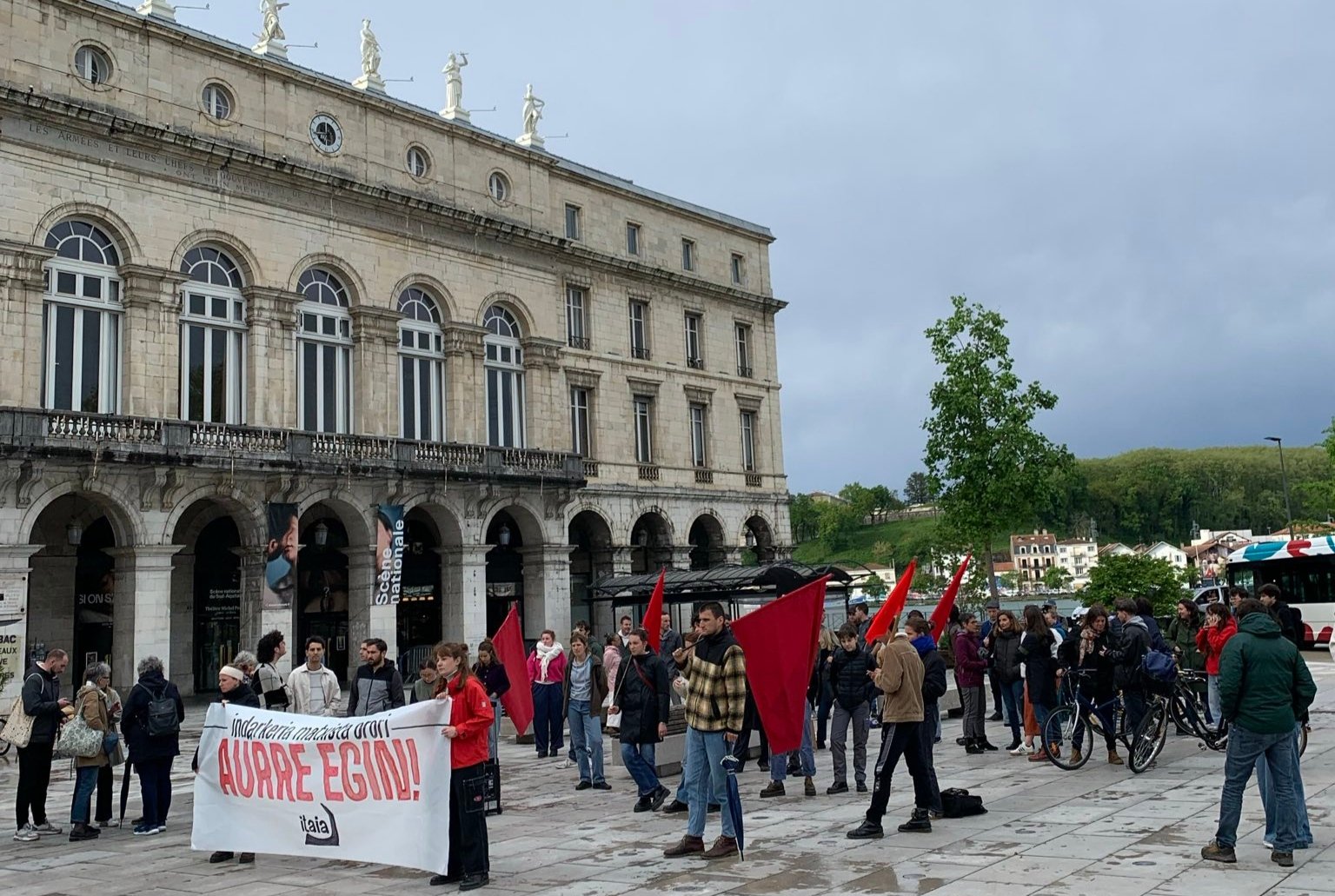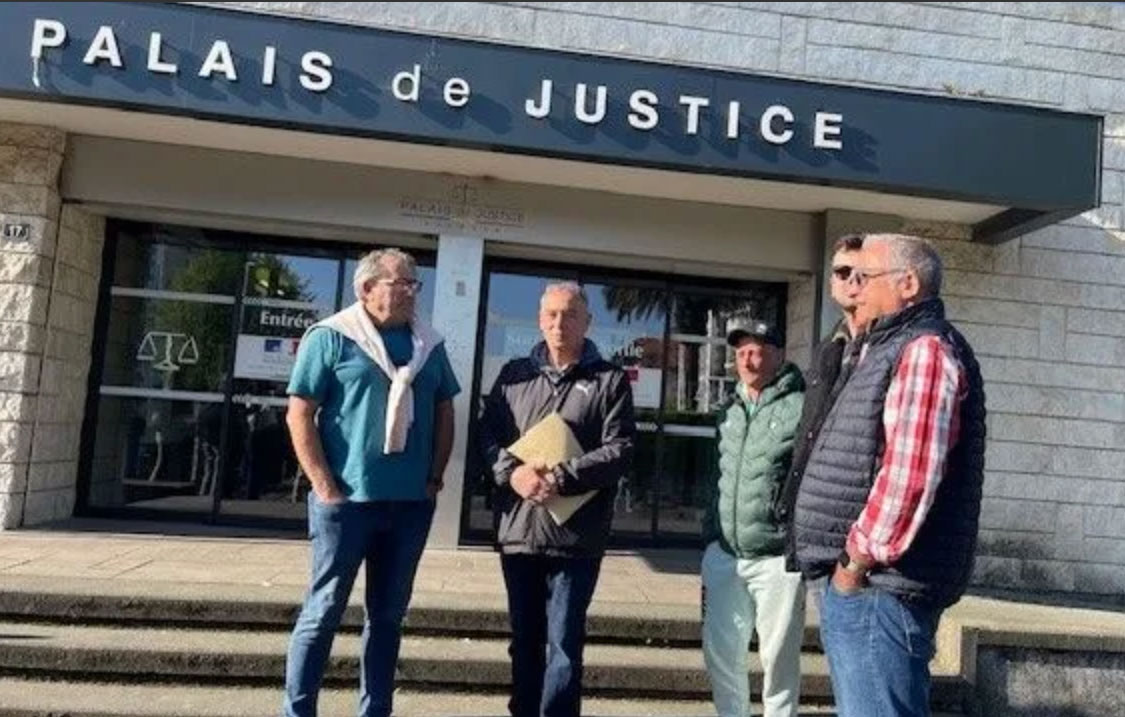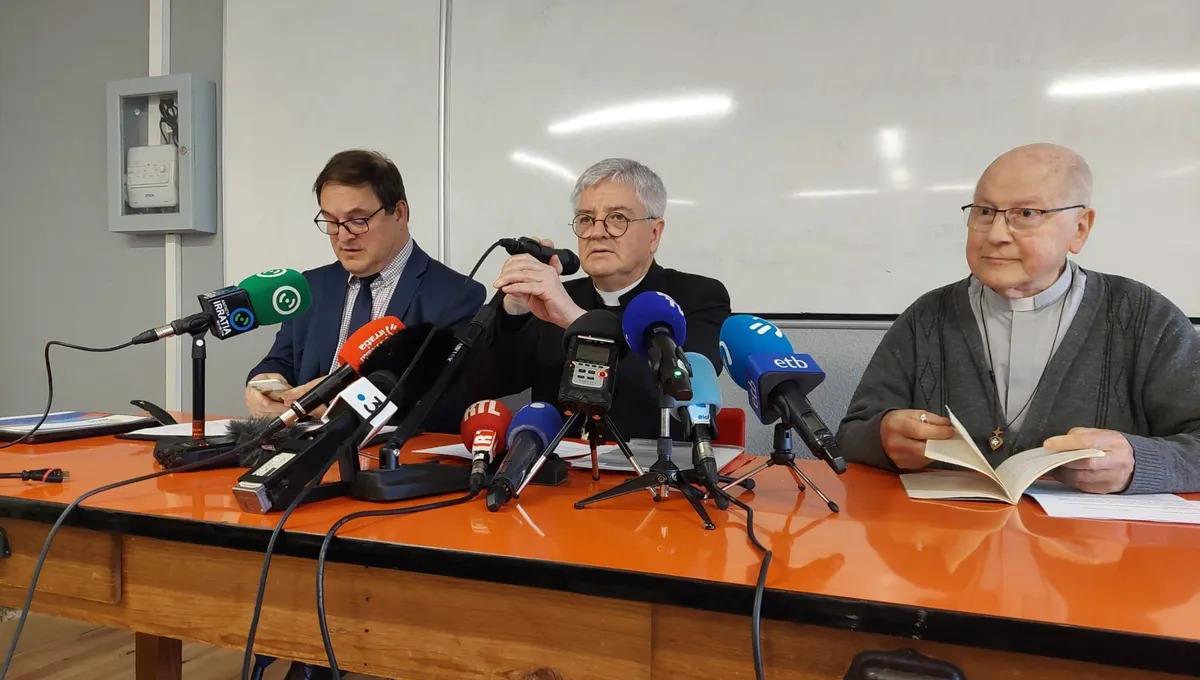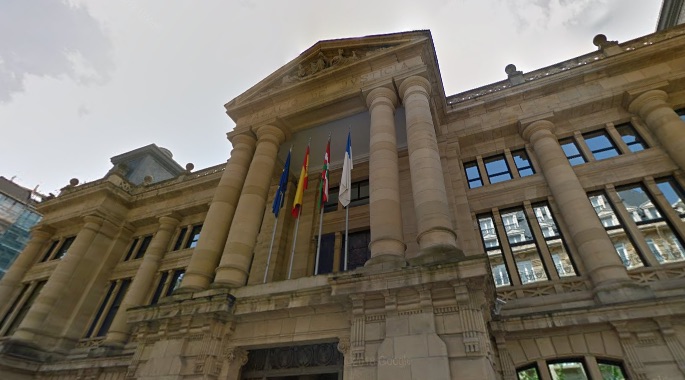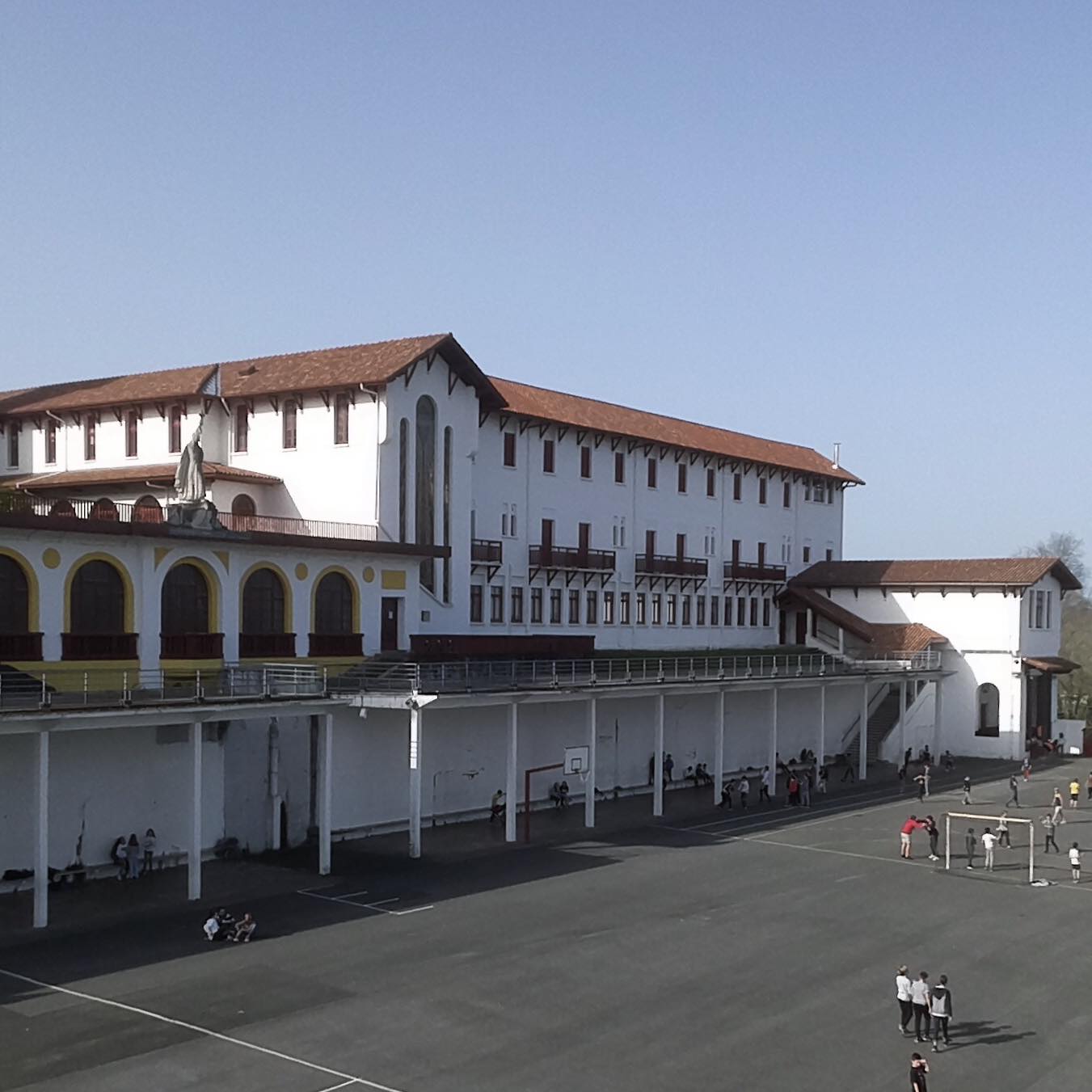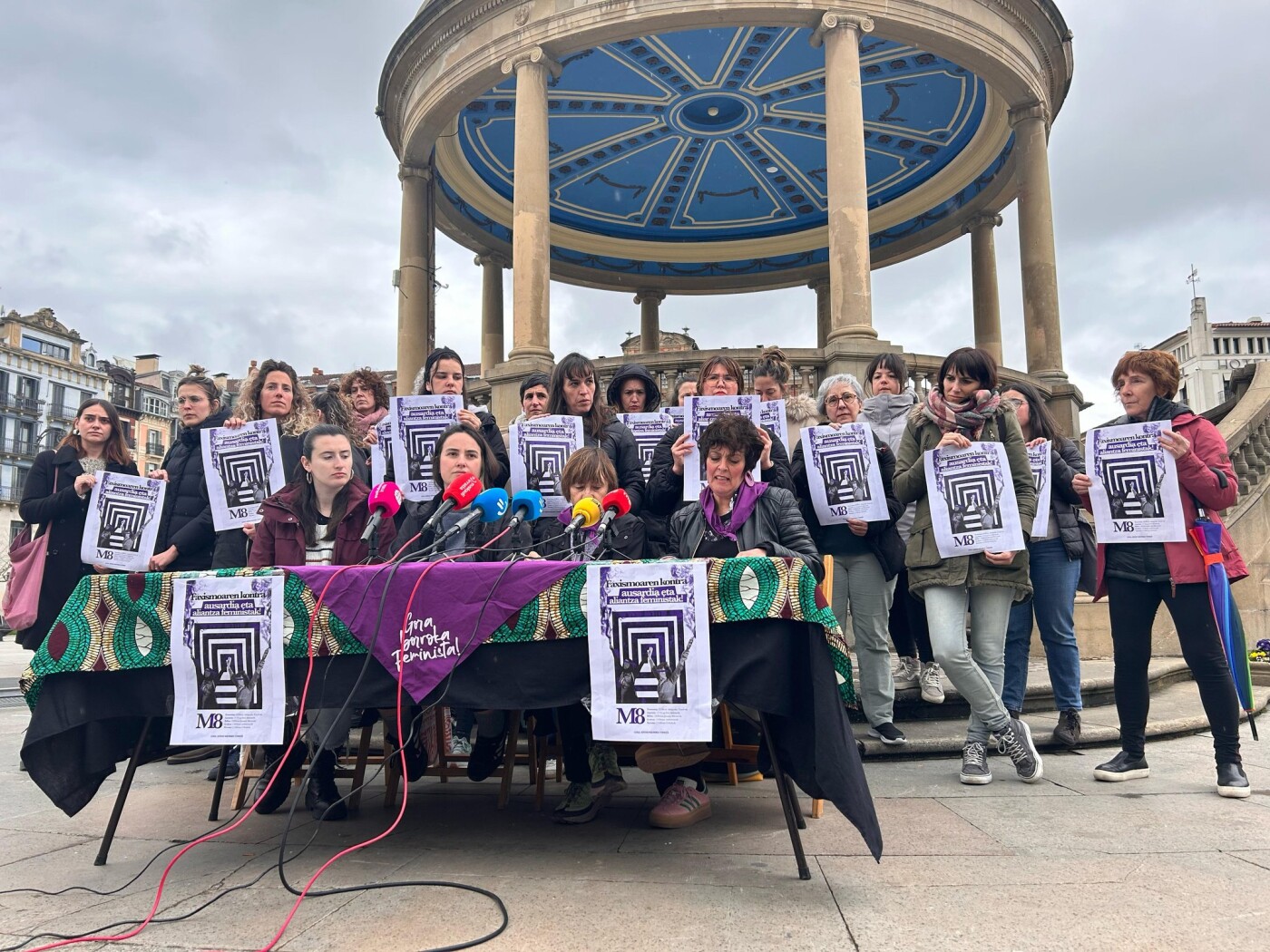“Don’t denounce obstetric violence, if you don’t clearly lose: time, money and mental health”
- The United Nations condemns the Spanish State for the violence that Nahia Alkorta received in her first birth, but governments reject the resolution. He has written the book 'My Stolen Birth' to socialize the lived and explain that it is a systemic problem.

Nahia Alkorta Elezgarai (Zizurkil, Gipuzkoa, 1986) is known among the feminist mothers of the Basque Country for their space of information and accompaniment in Basque in the Sabeletik Mundura project, as well as for the conduct of podcast by Ama(T). However, we were surprised when we saw that it was news in the media. In fact, the United Nations Convention on the Elimination of All Forms of Discrimination against Women (CEDAW) has condemned the Spanish State three times for accepting impunity for allegations of obstetric violence, and one for the Alkorta case.
In his book My Stolen Birth (Arpa, 2023) he chronicles his first birth, which begins with authoritarian attitudes and information, ends with an unauthorized cesarean section and causes post-traumatic stress disorder. It also explains the leap it took from the recognition of its status as a victim to the judicial struggle. In addition, the first person extends the focus and places obstetrical and gecto-obstetric violence within the framework of sexual reproduction rights and macho violence, as well as in the elaboration of a historical memory. There are still many outstanding injuries, including the failure of the most feminist government in Spain to comply with the resolution, the denial of responsibility by Osakidetza and the lack of protection of feminist movements.
You have been fighting for twelve years and it is not yet over. When do you decide to use the book format to spread your story?
He was very clear that if international recognition came, he wanted to socialize the issue. So far, I've influenced from activism, somehow in the underground. When the resolution came out, I decided to give my face, put my body. In this first impulse, press coverage was large, but socialization was cold. I think it is necessary to tell my whole story and put it right.
It is very common to receive the following warning to impose an intervention: “If you don’t, something will happen to your child”
What is gecto-ovarian violence and why is it male?
It is a control over our body that can be applied in any gecto-obstetric process, although the most visible is that of births. I would like to stress that the key is not instrumentalisation, because violence is also denial of intervention, these are clear examples of violations of the right to abortion. The key lies in the patriarchal view of the medical system and in the treatment it gives us: stereotypations, sentences (for excessive thickness, for your sexual practices, sexual orientation…). It is worth highlighting the psychological aspect of this male violence: threats, coercion, fear… It is very common to receive the following warning to impose an intervention: “If you do not, something will happen to your child”. In the last questionnaire conducted at the state level, 40% of women acknowledge having experienced this type of violence. To them must be added those who are not aware.
Your account reflects the relationship with sexual violence, both because of the violence itself and because of the psychiatric suffering it caused you.
In another context there is no doubt that putting your fingers in your shirt is an abuse. On the contrary, it is normalized not knowing how many tacts you have had in childbirth, nor how many people have made you.
Does an effect me too on your presentations? How does your emotional burden live?
Today I manage it relatively easily, taking distance, but it was difficult when the resolution came out, because I received over 200 testimonies and was in a sensitive emotional situation. Me too is an interesting dynamic, but it's mostly between mothers. The challenge is to reach people who are not mothers but who have suffered gecto-obstetric violence.
Inés Osinaga says that we are not all mothers, but that we are all daughters. Why lack of interest in this issue?
On the one hand, I think there is still a very strong discourse against motherhood. On the other hand, besides ignorance, there is pain. Many believe it has nothing to do with them until they identify with a certain testimony. Feeling a victim is a very hard process psychologically.
“The system has that other tool, that of denial: you’re crazy, you said, it’s not that much…”
I was struck to read that the “Basque oasis” had a hard time identifying the violence.
Yes, twelve years ago Osakidetza had better marketing campaign! I knew that there was obstetric violence, I was very conscious, but I didn't think I was going to be here, white, young and not particularly gross. I struggled to dismantle that belief. I sought the culprits inside my house: child, partner, myself… I realized it is a systematic art. The system has another instrument, that of denial: you're crazy, you said, it's not that much... It also shows up when we're touched by the ass in the juerga.
You also struggled to speak in Basque.
In my birth plan, I asked for it to be preferably treated in Basque, because it was important to me in this process. What happened to us in the controls of the civil guards: I was treated with respect in theory, but behind you there is an imposition of power, including linguistics.
Her first step was to send a letter to the hospital. He received no answer. The Basque Government’s public response to the CEDAW resolution has been regrettable: the monitoring of deliveries in Osakidetza is “excellent and unforgettable”.
I was very surprised. When I filed a complaint at the hospital, I thought there was a bad practice: they wouldn't do vasectomy for a man without permission. I, too, will have to agree if I am going to get the tile. However, seven layers of my body were cut off without permission. I thought they were going to have an empathy point. No, they did great.
Patriarchy promotes guilt in women and rage in men. It strikes me that I do not blame the professionals. Did you suppress rabies towards them?
I think it's also been a mechanism for myself to really understand what happened to me. If I were focused on those 3-4 professionals, surely my training process would be harder and fighting too. Because in the judicial struggle it goes against the great enemy. What is built from hatred is weaker in normal struggle. To what extent are you conscious? Well, I don't know. I still await these letters, perhaps not on behalf of Osakidetza but on a personal level.
She explains that more than a specific law on obstetric violence, compliance with the law on patient autonomy would suffice.
I notice an ambivalent effect. On the one hand, the concrete typification would give some authority to the issue, but they have introduced it in the new law of equality of the Autonomous Community of the Basque Country and has had no clear consequences. On the other hand, this typification would entail the complete closure of the concept, with the risk of excluding the psychological. On the contrary, if the law of patient autonomy were applied, nothing else would be necessary.
“Emaginena is the group with the highest level of burn out syndrome”
In your story, it's exciting to detect the impotence of the midwife.
Women are the direct victims of socio-ovarian violence, but there are many other victims. On the one hand, for the child, the birth in violence will have consequences. On the other hand, professionals working in precarious and hierarchical conditions within the health system are obliged to do things they do not want to do. Midwives reported the highest burn out syndrome. The Cruces Hospital conducted a campaign in December indicating the number of missing midwives. The direct consequence of insufficient resources is that more interventions will be undertaken. The reason for accelerating my delivery was that at ten in the morning they had a scheduled C-section.
Her husband also lived the violence.
They didn't allow me to help, and they also got a bad deal. After the C-section, I was not taken from the recovery area to the room due to lack of resources. When he asked for me, a professional said to him, "It takes a long time, maybe something has happened to him." I mean, my partner thought I was dead, and I thought the child was dead. It wasn't necessary.
CEDAW has punished a State three times for obstetric violence, being Spain in all three cases. Why is the force of movements like ours?
Yes. Obstetric violence is not exclusive to the Spanish State, but these networks of women are very strong, it has just turned 20 years Childbirth is. We have tireless lawyers and psychiatrists doing great activism. It should be noted that all CEDAW member States must comply with the measures prescribed in the three resolutions. This has generated enormous media interest at international level, while silence and the will to hide have prevailed here. The resolution has come when in Spain we had in theory the most feminist government in history. Non-compliance with the voluntary period has been a political choice. It is very worrying because the State lawyer has responded that the State is sovereign to breach the international resolution. This can generate case law for any other kind of violence; if internationalization is useless, we will be left out of impunity. In this port, we three are obliged to continue until the end, although we run the risk of having to pay the costs of the process. In other words, we may end up condemned.
Here I see another parallel with other Machistan violence: revictimization in the judicial process.
Yes, women ask me a lot: “Where do I have to report mine?” [Laughter] Wait! If there are no unusual physical effects such as fecal incontinence, you probably won't get the test. You can't go into a judicial process where if you don't have it, you're going to lose it clearly: besides the case, time, money and mental health. Here, too, we need feminist self-defense and networks. Patriarchal justice does not help us, but inclusion can help, as we have done with the normalization of male violence at the partner level.
In the documentary Parir in the twenty-first century a Extremadura victim with fecal incontinence appears, however, the institutions have not accepted their complaint. How is that possible?
It has happened that in the obstetric violence trials, after the women have detailed their entire report, the couple say that they have not touched their skin for three years, and that this data is decisive for the judge to acknowledge the complaint.
It talks about the practice of “husband’s point”. What is it?
Yes, it is about coping when the habit is broken, so that it is narrower, for the enjoyment of man, with the side effects that this entails (not only in penetration, but in the discomfort that this tension causes in daily life). “I’m going to leave you new,” Machistan gynecologists say. It's clear that our bodies are battlefield.
The PSOE was in the Ministries of Health and Justice when the resolution came out, and Podemos in the Ministry of Equality. What role did they play?
We could commit to introducing obstetric violence in the reform of the abortion bill, but the medical lobby and the PSOE did not let him. It was a great recession, because it was a historic opportunity.
“It seems that those of us who have freely chosen to be mothers are on the verge of feminism, and that the violence that happens to us is a price to pay”
Then he tried to get the support of the feminist associations of the Basque Country to press. What response have you received?
Silence. Cri. It has been very painful. We touched different doors through peers like you. That the choice we gave them was historic and I felt a total helplessness. It's not time, it's not on the agenda, we don't want to talk about it. It seems that those of us who have freely chosen to be mothers are on the brink of feminism, and that the violence that happens to us is a price to pay. With abortion we can easily see gecto-obstetric violence: having to do it in private clinics, receiving sentences, praying to Christians… But we decide to be a mother and we do not recognize the violence of whoever decides to be a therapeutic abortion! I am also waiting for the letter here.
Why is it not understood that the respected delivery is part of “We stop, we so many times”?
I think it's a kind of violence that you want to silence, because you want to put others in the middle, and I understand it, but behind it puts the victims. In the 1970s and 1980s, it was necessary to demand the abolition of motherhood, because it was a social power, because the heterosexual couple was the only legitimized model, you had to stay at home... Fortunately, we have guaranteed the right to abortion, although we have to keep fighting. Currently, motherhood is a decision, but we do not know how to place these free mothers in this new scheme if they do not materialize in the pair bollera or tribe. One proof is that the general feminist strike focused on care, but the word mother did not appear.
I was struck to see in public the days organized by Emagine (No)Maternities from the Feminist perspective and not among the rapporteurs.
It was a gift to me to know that this congress was going to be organized, also shortly after the resolution. It was clear that the issue of obstetric violence had to have a place, but it was decided not, and I had to listen “if you want to talk about public”. It is not bad that some rapporteurs commented. The centrality of the mother and child discourses was painful. We should go down from discourse to earth and recognize that every day we see mothers in the street dragging a capitalist heteropatriarchal system. Education in co-education and empowerment of future generations is a huge responsibility. That mother you're probably judging is making a huge effort to make her son not a slug.
“What is feminist motherhood for you?”
These feminist mother-of-pearl feminists tend to attribute essentialism to those who work in feminist maternity hospitals.
That label comes from prejudice and not hearing us. Feminist mothers are constantly questioning us and it is very violent that we also receive the sentence from our members. I have always argued that all decisions are free and informed, and what I demand is a joyful maternity. Some will get pleasure from nursing, others from the bottle, some will want interventional delivery, others at sea. That is why I asked all the guests to my podcast “What is feminist motherhood for you?” The answers are very varied. I see infantilization: mom can't think, theorize.
During this polarized debate, we did not react when the police go home to a woman from Oviedo to force her to give birth in the hospital. As with abortion, patriarchy seems to want to save children from the irresponsibility of pregnant women.
The woman who accompanied the midwife at home was cared for and was not in danger, the proof is that the hospital did not immediately induce the delivery. He jumped into the press but it was not the only case. This is unthinkable with other medical interventions.
The book talks about the specific gecto-obstetric violence suffered by gypsy, immigrant, fat or lesbian women.
At the crossings, they put all the gypsies in the same room, at the end of the hallway, so they don't bother. Muslim immigrants, with language difficulties, are completely unprotected when they are isolated from their husbands. During pregnancy, eating disorders may appear due to the weight of lophobia in obstetric care. Access the midwife consultation and access the scale directly. All tentacles appear in this very vulnerable process.
“We must defend midwives taking into account their low recognition in the medical system. Many are about to retire and there is no relief, because it is a political decision not to offer places”
As for historical memory, you remember that many of the witch hunters were midwives and were relegated to patriarchal obstetricians.
Yes, midwives are the heirs to these parts of witches, whose role is to help women from menarche to menopause from a health point of view. On the contrary, the gynecologist is a doctor and is often oriented towards pathology. Many women tell you, “My delivery was going well until the gynecologist appeared.” We must defend midwives taking into account their low recognition in the medical system. Many are about to retire and there is no relay, because it is a political decision not to offer places.
What would you say about the doulos? Are they not witches today, very caricaturized and marginalized? I had to go but they didn't allow him to enter the room.
Their work is emotional support and knowledge transmission. Many of us have known nothing about pregnancies and have not taken a baby in our arms until we have not been mothers. Midwives have the ability to do it on their own, they don't have enough time in this system. Only one companion is allowed in childbirth and the partner is usually preferred rather than the experienced woman, although many men have placed only their child. Many husbands prepare well, but others accept violence: for example, someone has been asked to do the cristeller maneuver [pressure on the abdomen, today considered obstetric violence] and has done so because of ignorance.
A Basque concept appears in the book: “atsolorra”.
It is a party that is held in and around Hernani, but in its origin it was a process in which the women of the town met to help the woman of her birth. In other villages it was said that until the end of the quarantine the mother could not leave the attic and the other women took her food. The perinatal psychiatrist Ibone Olza explains the origin of the expression “to give birth”: when the pregnancy was long, all the women of the town were going to criticize it at the woman’s house and rage activated the delivery. My mother always said that the pregnancy was ten moons; we have been robbed a month. Until two generations ago, this knowledge and accompaniment existed and men did not have prominence.
On the other hand, remember the collective trauma of the stolen babies.
She meets an amama, who didn't move by her when her granddaughter was born, because she believed a baby was stolen from her in that hospital. Another challenge that feminism has not assumed is to analyze this issue in depth. It's a ghost of the medical system, victims also very denied.
Finally, what taste has the writing process left?
It's been very therapeutic. In the judicial process, I had to repeat the story over and over again, and it's been hard for me to take power to go out into the world, but then it's been a book written in a week. It's my story, but it has a lot of collectivity.
Prentsaurrekoa eskaini dute ostegun honetan Marc Aillet Baionako apezpikuak, elizbarrutiko hezkuntza katolikoko zuzendari Vincent Destaisek eta Betharramgo biktimen entzuteko egiturako partaideetarikoa den Laurent Bacho apaizak. Hitza hartzera zihoazela, momentua moztu die... [+]
Antifaxismoari buruz idatzi nahiko nuke, hori baita aurten mugimendu feministaren gaia. Alabaina, eskratxea egin diote Martxoaren 8ko bezperan euskal kazetari antifaxista eta profeminista bati.
Gizonak bere lehenengo liburua aurkeztu du Madrilen bi kazetari ospetsuk... [+]
11 adin txikikori sexu erasoak egiteagatik 85 urteko kartzela zigorra galdegin du Gipuzkoako fiskaltzak. Astelehenean hasi da epaiketa eta gutxienez martxoaren 21era arte luzatuko da.
Matxismoa normalizatzen ari da, eskuin muturreko alderdien nahiz sare sozialetako pertsonaien eskutik, ideia matxistak zabaltzen eta egonkortzen ari baitira gizarte osoan. Egoera larria da, eta are larriagoa izan daiteke, ideia zein jarrera matxistei eta erreakzionarioei ateak... [+]
Elizak 23 kasu ditu onarturik Nafarroa Garaian. Haiek "ekonomikoki, psikologikoki eta espiritualki laguntzeko" konpromisoa adierazi du Iruñeko artzapezpikuak.
15 urteko emakume bati egin dio eraso Izarra klubean jarduten zuen pilota entrenatzaile batek.
Lestelle-Betharramgo (Biarno) ikastetxe katolikoko indarkeria eta bortxaketa kasuen salaketek beste ikastetxe katoliko batzuen gainean jarri du fokua. Ipar Euskal Herriari dagokionez, Uztaritzeko San Frantses Xabier kolegioan pairaturiko indarkeria kasuak azaleratu dira... [+]
Bi neska komisarian, urduri, hiru urtetik gora luzatu den jazarpen egoera salatzen. Izendatzen. Tipo berbera agertzen zaielako nonahi. Presentzia arraro berbera neskek parte hartzen duten ekitaldi kulturaletako atarietan, bietako baten amaren etxepean, bestea korrika egitera... [+]
Martxoak 8a heltzear da beste urtebetez, eta nahiz eta zenbaitek erabiltzen duten urtean behin beren irudia morez margotzeko soilik, feministek kaleak aldarriz betetzeko baliatzen dute egun seinalatu hau. 2020an, duela bost urte, milaka emakumek elkarrekin oihukatu zuten euren... [+]
Neska adingabeari sexu abusuak era jarraituan egin zizkiola frogatutzat jo du Bizkaiko Lurralde Auzitegiak.
1989tik 2014ra, Frantzia mendebaldeko hainbat ospitaletan egindako erasoengatik epaituko dute. 74 urte ditu Joel Le Scouarnec zirujau ohiak, eta espetxean dago beste lau sexu eraso kasurengatik.
Lau mila karaktere ditut kontatu behar dudana kontatzeko. Esan behar ditut gauzak argi, zehatz, soil, eta ahalko banu polit, elegante, egoki. Baga, biga, higa. Milimetrikoki neurtu beharra dut, erregelaz markatu agitazioa non amaitzen den eta propaganda non hasi. Literarioki,... [+]










